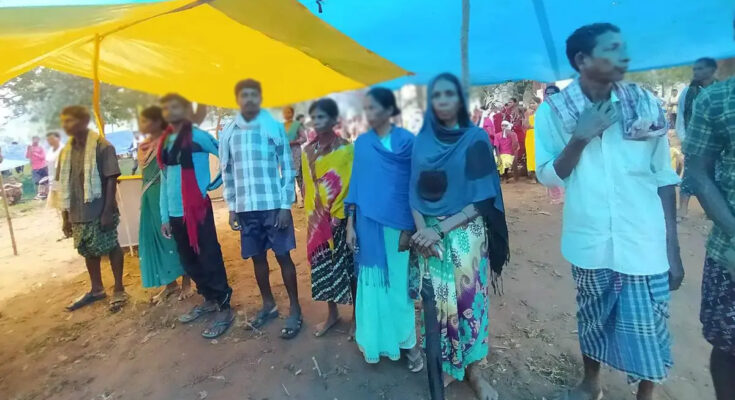Raipur12 october 2021. THERE IS no school, no anganwadi, no health centre, no ration shop.
There’s just the lingering pain of loss, simmering anger — and, for Sanaki Punem, her nine-year-old grandson Mahesh.
At Edesmetta, nestled in forested hillocks on the border of Dantewada and Bijapur and still only accessible on foot, Punem never lets Mahesh out of sight. Even when the 59-year-old sits down under a neem tree near her hut to speak, her eyes constantly follow him. “I am scared to let him go too far, he is all I have,” she said.
Punem’s son and Mahesh’s father, Sonu Punem, was among the eight branded as “Maoists” and gunned down in Edesmetta by security personnel on the night of May 16-17, 2013. Last month, a judicial probe report submitted to the Chhattisgarh government confirmed what the residents of this village had been saying all along: the encounter was a “mistake” and none of those killed were Maoists.
“Now the government has to make amends. Those responsible should be punished,” Punem said.
It’s a refrain that echoes across Edesmetta. Residents say this was once a sprawling village that retreated into the forests after Salwa Judum, the vigilante force raised by the then government, marked its presence for the first time.
“They burnt our houses, fields, even our shrines. So, we had to move towards the jungles. We saw real violence between 2007 and 2010. We had been living in relative peace till 2013,” Mangu Karam, a small-time paddy farmer like most of the residents, said.
With the nearest motorable road 15 km away in Gangaloor, the judicial report has given strength to the demand for compensation of at least Rs 1 crore to the families of those killed in the encounter — and better living conditions.
“To reach the nearest school in Gangaloor, children have to cross two hills and four streams. Sometimes, the security forces stop them,” Punem said.
“This village is spread over more than 8 km in six paras (localities), and we have seven hand pumps in all, out of which four have stopped working for more than a year. Many of us drink water from the nullahs (streams). We have informed officials and panchayat representatives in Burji (the gram panchayat base) but no one has come to even see what the problem is,” Sannu Karam, another resident, said.
Residents say most of the 60 families in the village have ration cards, but getting basic necessities from the shop in Gangaloor is another challenge. “We have to trek back with the rice and other items, making multiple trips over days. Some of us have relatives in the Gangaloor area who keep our ration in their houses for us to pick up later,” Karam said.
But all is not lost for Edesmetta.
Described by officials as a “hotspot” for malaria, the village is currently witnessing the construction of its first government institution — a health sub-centre.
Work started on the building in May, and the base has been laid. “The doctors who visit us say that by next year, the hospital will be ready. Currently, for everything from a fever to snakebite, we have to take the patients to Gangaloor across the hills,” Babloo Karam, a resident, said. No Covid case has been reported so far.
According to District Collector Rajendra Kumar Katara, the biggest challenge in providing government infrastructure in far-flung villages like Edesmetta is the “security threat” of Maoists.
“Our ground teams face tremendous challenges, threats and arbitrary stoppage of work whenever they try to visit these villages. There is also a lot of fear among the teams that have to carry out work in these regions. Unless the security forces reach and establish safe passage, our teams can’t freely go out,” he said.
“However, a lot of work is under process, and the development of infrastructure in these regions is a priority,” Katara said.
But in Edesmetta, the distrust runs deep. Here, the residents don’t want security forces to be deployed, even for development work. In February 2020, they say, six women of the village were beaten up. Silca Tati and Sunita Karam say they were among them.
“All we did was ask why they were chasing our husbands from their fields, and they turned on us,” Tati said. “If the security forces can come, why can’t anganwadi workers, health workers and other government staff? They are building the hospital, no one has stopped the work so far,” Karam said.
Back under the neem tree, Sanaki Punem’s worries are all about Mahesh.
“Sonu was my youngest child, born after two daughters. My husband died within a year of Sonu’s death. He couldn’t bear the pain of losing our son. In 2015, Sonu’s wife married another man and left the village leaving Mahesh with me,” she said. “My grandson has never been to school.



